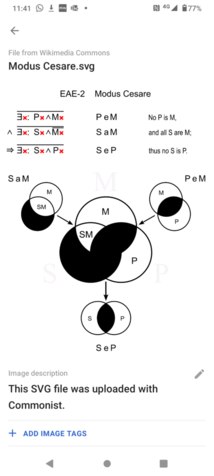-
 KantDane21
47The following argument is in Paul Guyer's text "Kant" (Routledge). I am trying to reconstruct it, yet am not sure the of the form of the argument.
KantDane21
47The following argument is in Paul Guyer's text "Kant" (Routledge). I am trying to reconstruct it, yet am not sure the of the form of the argument.
If whenever one experiences appearances, one does not gain knowledge of the noumenon, and yet (in) one’s awareness of one’s own individual will does gain knowledge of the noumenon, then one’s awareness of one’s own individual will could not be the experiencing of appearances.
A- one experiences appearances B- one gains knowledge of the noumenon C- awareness of one’s own individual will
Thus:
If A then not B If C then B C then not A
Yet the above is not a valid argument form (as far as I can determine). -
 bongo fury
1.8k
bongo fury
1.8k -
 KantDane21
47something like:
KantDane21
47something like:
No experience of appearance results in knowledge of noumenon
All awareness of will is knowledge of noumenon
thus,
No awareness of will is experience of appearance. -
 alan1000
210bongo fury, please don't fall into the habit of relying on Wikipedia to support your arguments! Its contributors are, by and large, utterly unfamiliar with the philosophy of mathematics. Its article listing the arguments to prove that 0 is an even number is an intellectual fog from beginning to end.
alan1000
210bongo fury, please don't fall into the habit of relying on Wikipedia to support your arguments! Its contributors are, by and large, utterly unfamiliar with the philosophy of mathematics. Its article listing the arguments to prove that 0 is an even number is an intellectual fog from beginning to end.
Welcome to The Philosophy Forum!
Get involved in philosophical discussions about knowledge, truth, language, consciousness, science, politics, religion, logic and mathematics, art, history, and lots more. No ads, no clutter, and very little agreement — just fascinating conversations.
Categories
- Guest category
- Phil. Writing Challenge - June 2025
- The Lounge
- General Philosophy
- Metaphysics & Epistemology
- Philosophy of Mind
- Ethics
- Political Philosophy
- Philosophy of Art
- Logic & Philosophy of Mathematics
- Philosophy of Religion
- Philosophy of Science
- Philosophy of Language
- Interesting Stuff
- Politics and Current Affairs
- Humanities and Social Sciences
- Science and Technology
- Non-English Discussion
- German Discussion
- Spanish Discussion
- Learning Centre
- Resources
- Books and Papers
- Reading groups
- Questions
- Guest Speakers
- David Pearce
- Massimo Pigliucci
- Debates
- Debate Proposals
- Debate Discussion
- Feedback
- Article submissions
- About TPF
- Help
More Discussions
- Other sites we like
- Social media
- Terms of Service
- Sign In
- Created with PlushForums
- © 2026 The Philosophy Forum



